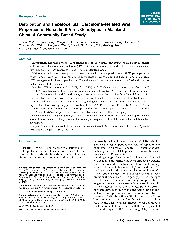摘要
Introduction: Hepatitis B virus (HBV) genotypes, replication status, and mutations have been associated with the risk of hepatocellular carcinoma (HCC). Our aim was to study the distribution and HCC-related viral properties of HBV genotypes/subgenotypes in Mainland China.
Methods: A multistage cluster probability sampling method was applied to select 81,775 participants between 1 and 59 years at 160 national disease surveillance points. We examined hepatitis B surface antigen, HBV genotypes and subgenotypes, hepatitis B e antigen, viral load, and mutations in the PreS and core promoter regions of HBV genome.
Results: HBV subgenotypes B2 (27.3%), C1 (10.7%), and C2 (58.0%) were predominant. Genotype D (D1, 80.8%) was frequent in the Uygur. We identified a new subgenotype, C9, mainly in Tibetans. Compositions of subgenotypes B2 and C1 and genotype mixture increased from the North to Central South, which was consistently associated with the increasing prevalence of hepatitis B surface antigen. Hepatitis B e antigen positivity and viral loads were higher in the young with genotype B and declined more rapidly with increasing age than those with genotype C. In contrast to G1896A, PreS deletion, T31C, T1753V, and A1762T/G1764A were more frequent in subgenotype C2 than in subgenotype B2. A1762T/G1764A, T1753V, C1653T, and G1896A, except PreS deletion, consecutively increased with increasing age.
Conclusion: HBV subgenotypes B2, C1, and C2 are endemic in Mainland China. HBV genotype C exhibits less replication activity in the young and harbors higher frequencies of the HCC-associated mutations than genotype B.
Impact: These basic data could help evaluate the association of HBV variations with HCC. Cancer Epidemiol Biomarkers Prev; 19(3); 777-86.
- 出版日期2010-3
- 单位中国人民解放军第二军医大学; 中国疾病预防控制中心
